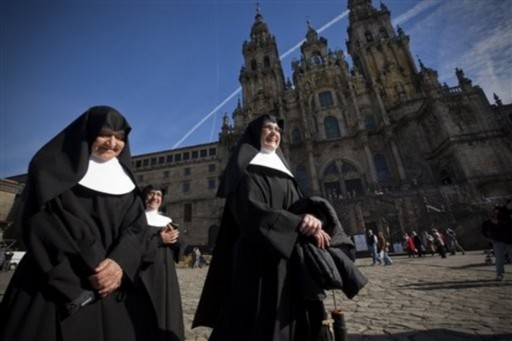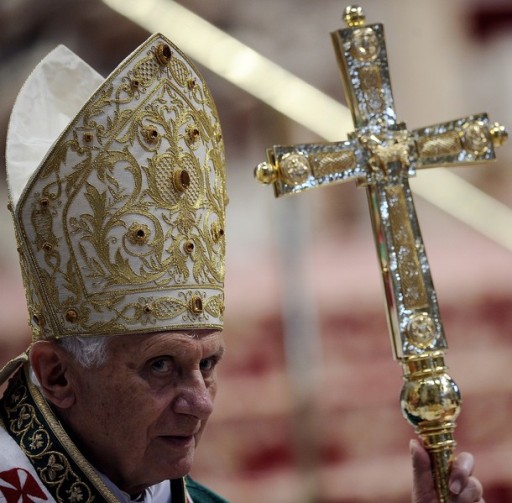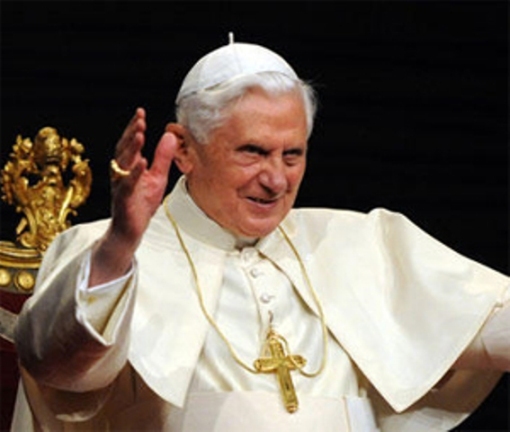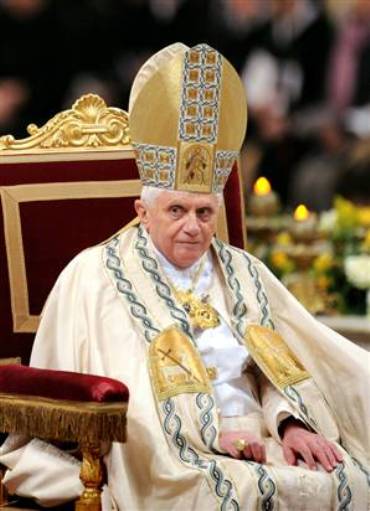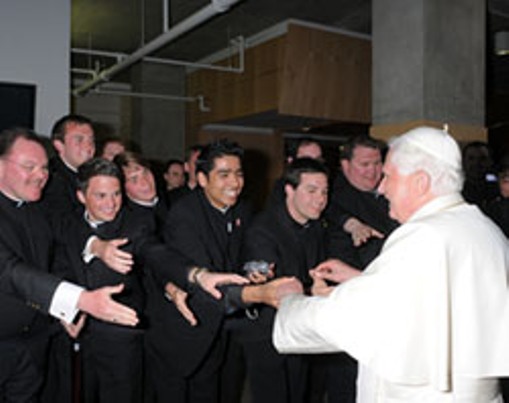
- Pope Benedict XVI walks with his pastoral staff outside the Sagrada Familia church in Barcelona, Spain, Sunday, Nov. 7, 2010. The Pope consecrated La Sagrada Familia, the Barcelona landmark designed by Antoni Gaudi, whose construction began in 1882 and continues today. (Getty Images / AP Photo/Osservatore Romano, HO)
Barcelona, Spain, Nov 8, 2010 / 08:11 pm (
CNA/EWTN News).- Pope Benedict XVI used his weekend pilgrimage to Spain, Nov. 6-7, to outline his vision for the "re-evangelization" not only of Spain, but of Europe and the West.
From his first words to his last, the Pope’s message was focused on drawing from Spain’s Christian roots — the great legacy of saints such as John of the Cross, Teresa of Avila, Ignatius of Loyola, and Francis Xavier — and nourishing what he called a “faith sown already at the dawn of Christianity, one which blossomed and grew in the warmth of countless examples of holiness, giving rise to countless institutions of beneficence, culture and education.”
The Pope set the tone for his trip on the flight to Santiago. He spoke of what has emerged as a central theme of his pontificate, the “challenge of secularism” in the West and the need for the Church to confront it.
In his arrival speech, the Pope once more sounded the theme: “I too wish to encourage Spain and Europe to build their present and to project their future on the basis of the authentic truth about man, on the basis of the freedom which respects this truth and never harms it, and on the basis of justice for all, beginning with the poorest and the most defenseless,” he said. “A Spain and a Europe concerned not only with people’s material needs but also with their moral and social, spiritual and religious needs, since all these are genuine requirements of our common humanity and only in this way can work be done effectively, integrally and fruitfully for man’s good.”
Although Spain still counts nearly three-quarters of its population as Catholic, less than 15 percent of the nation's more than 40 million people participate in Church life.
Pope Benedict hit repeatedly on the importance of upholding the value of human life in all forms, especially those who are most vulnerable as a key part of the Catholic message to a secularized society.
Medicine should never be used in ways that are disrespectful for human life and dignity, the Pope explained. He called for state aid for the “sacred and inviolable” lives of children from the moment of their conception. He also encouraged social and economic assistance for women so that they can find “full development” at home or work, support for men and women in their marriages, and assistance for growing families.
Strong and faithful families are necessary to the future and vitality of society, the Pope said, calling "the renewal of the family as society's fundamental cell" the "great theme" of today.
In a Mass celebrated for 7,000 faithful in Santiago's Obradoiro Square on the first day of the trip, the Pope used his homily to again urge a renewed struggle against secularism. "Europe must open itself to God, must come to meet him without fear, and work with his grace for that human dignity which was discerned by her best traditions," he said.
There is a need, he added, “to hear God once again under the skies of Europe.” He hoped that “this holy word not be spoken in vain,” and that it would not serve purposes other than its own. “It needs to be spoken in a holy way. And we must hear it in this way in ordinary life, in the silence of work, in brotherly love and in the difficulties that years bring on.”
In Barcelona on the second day of the journey, during the dedication Mass to consecrate the altar of the Basilica of the Sagrada Familia, Pope Benedict drew inspiration from the architect Antoni Gaudi's vision in building his masterpiece. He referred to the dedication of the church as “an event of great importance” in the context of “a time in which man claims to be able to build his life without God, as if God had nothing to say to him.”
Gaudi's masterpiece "shows us that God is the true measure of man, that the secret of authentic originality consists ... in returning to one’s origin which is God," said Benedict XVI.
In Santiago, the Holy Father spoke of the Church as a companion of man on the journey in search of truth, "yearning for complete fulfillment."
The words that followed could be considered the core of his message for the "new evangelization" of Spain and the West. The Church's mission, he said, is "to be among men and women an ever greater presence of Christ."
Analysts said the Pope’s words found a welcome among the Spanish faithful. Father Daniel Lorenzo, who heads a Spanish Church commission on art and culture, took part in the celebrations at the Cathedral of Santiago de Compostela. He told CNA that the Pope's message was one asking the people to live in an ever more intense communion within the Church and also with him as the Successor of Peter.
The Pope called them to return to the faith, "with rigor, " Father Lorenzo said, and after Mass, "to approach these times and the future with strength and courage, united in the faith and in dialogue with God."
Having attended the consecration of the newest basilica in the Catholic Church, Fr. Juan Rubio Fernandez, director of Spain's Catholic Magazine "Vida Nueva," told CNA that the act was "very symbolic" in being an important religious act in a "highly secularized area." It was a call to courage to all Spanish to live their faith openly, not "defending" it but "proposing" it to society, he said.
To live and transmit the message of transcendence, considering something beyond this earth, is thus a type of "goal" Spain's Catholics have taken from the act, he added. The dedication Mass also had strong symbolism for society as proof that faith and secularism can live together and have a common place in society, he said.
And, while this message has been pronounced by the Pope during other trips to widely secular parts of Europe like London, Paris or Prague, giving it in Barcelona, where there is a "strong impulse to the aggressive secularism is significant," said the priest.
In this context, he said, the Church's new evangelization through the new pontifical council does not wish to be a new form of "crusade," rather, it is "a rebirth of the faith."
(*)




